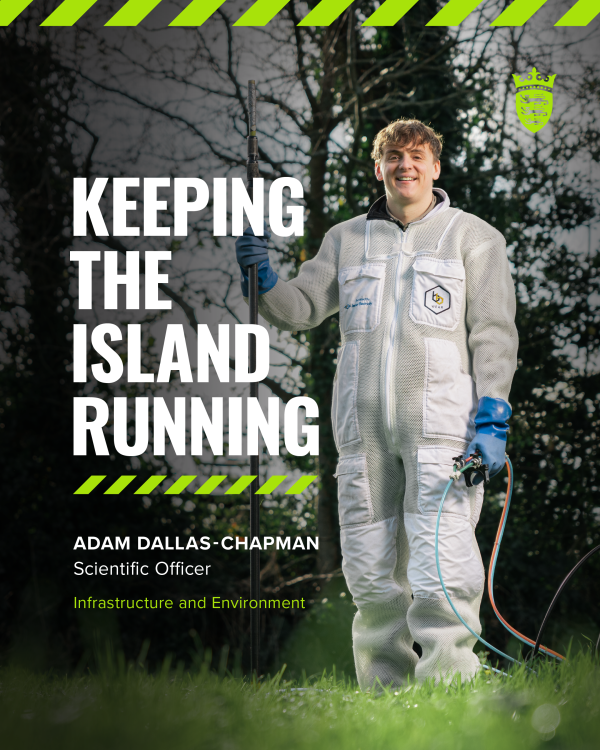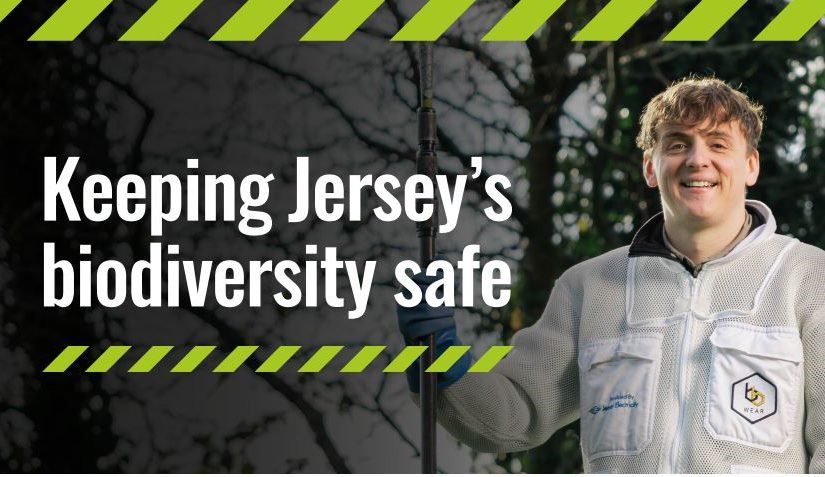Scientific Officer for Invasive Species in the Infrastructure and Environment Department, Adam Dallas-Chapman, is at the forefront of Jersey’s battle against invasive species.
From removing Asian Hornet nests to working collaboratively with counterparts in Guernsey, France and England, Adam is key in protecting the Island as we know it.
“My role is split in two,” Adam explains. “We manage all invasive species currently in Jersey, so that’s everything from Japanese Knotweed to Asian Hornets. The second part is looking at invasive species that may turn up in the future – we call those horizon scanned or alert species. We see where they are in Europe, how they could arrive in Jersey, and put plans in place to stop them arriving.”
With Asian Hornets being problematic to both the environment and human health, Adam explains how he tackles them: “Asian Hornets are crazy, you could go from a nest being in some brambles at someone’s house, to a tree 30 metres high. I use an extendable pole to reach the top of a tree where the nest is, then prod through the nest to get pesticide inside.”
Each nest, which could house up to 3,000 hornets, requires precision and protective equipment. Adam adds: “We wear full PPE, like a beekeeper’s suit, but with thicker material – two layers so if they get through the first layer, they still can’t sting us. I’ve never been stung, yet.”
With 186 invasive species already established in Jersey, and around 300 more identified as potential threats, they are a continuous problem for the Island.
“The quicker you can catch them, the less damage they can do. Even leaving them for a couple of years, or just a couple of months means they’ll start breeding, setting up populations, and the more of them there are, the harder they are to get rid of.”
Amongst Japanese Knotweed, Sour Fig, and Tree of Heaven, Asian Hornets are one of the more commonly known invasive species in Jersey. In 2024, 260 nests were destroyed.
“These nests can appear anywhere from a cliff top to the middle of Town. I dealt with one recently that was in the middle of Snow Hill Carpark, I used a cherry picker to climb to the top of the Fort Regent ramparts to deal with it.”
With invasive species now being recognised as one of the top five causes of biodiversity loss globally, on par with climate change, the threat for Jersey is personal.
“Biodiversity is the collection of all living things including plants and animals, so the biodiversity of Jersey is what makes our Island unique. If an invasive species becomes resident here, we lose the uniqueness of Jersey, and it just becomes an Island full of invasive species.”
When explaining the challenges of his role, Adam said: “We are occasionally battling against public opinion because we have to catch the animal or plant quite quickly, and eradicate it in most instances.
“While we do try and educate people about this, its often hard for the public to accept the difficult decision we have to make.”
Despite the challenges, Adam finds his role deeply rewarding and adds: “Asian Hornets and treating nests is quite a unique skill set. There are currently only around four of us who can do it in Jersey. I aways wanted to work in science, so this is the perfect role for me and ultimately I love protecting Jersey’s environment and heritage.”
How Islanders can help
Jersey’s fight against invasive species is a team effort, and Adam urges Islanders to report any sightings to invasives@gov.je and specific reports of Asian Hornets to asianhornet@gov.je
“Most invasive species have their busy period in the summer, but a lot of them are more noticeable in the winter because the leaves drop and so does the rest of vegetation, so you may spot strands of Knotweed, or a hornets nest for example.
“Stopping invasive species isn’t just down to me and my colleague Alastair, it really depends on the public too. If you see one and think ‘oh they must know about that already’, please do still report it on the off chance that we haven’t, as it’s so important we get rid of it.”
Ensuring Jersey’s environment and biodiversity is thriving for generations to come, Adam, along with the support of Islanders, is key in keeping the Island running and preserving what makes it unique.

 blog.gov.je
blog.gov.je